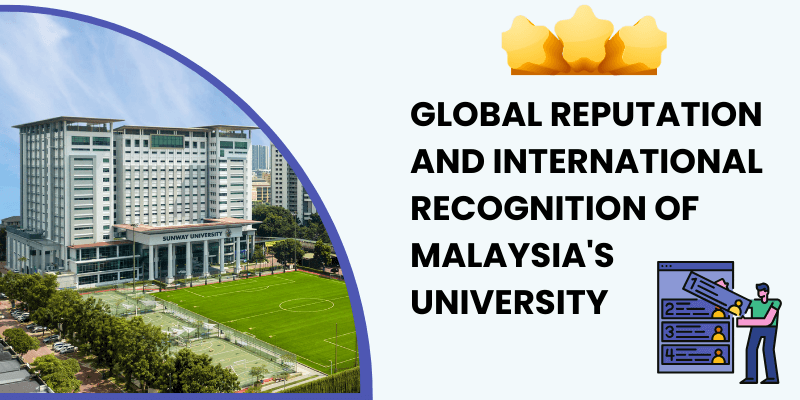From Local to Global: The Rise of Malaysia's Universities in International Rankings
April 15, 2024
Anis

In recent years, higher institutions in Malaysia have garnered increasing attention on the global stage, with a growing emphasis on their rankings, reputation, and international recognition.
This rise shows Malaysia's deliberate efforts to improve its higher education sector and to present its universities as significant contributors to the global knowledge economy.
This article highlights how universities in Malaysia aim for excellence and recognition on the global academic landscape by examining how rankings, reputation, and international recognition come together.
How do universities in Malaysia rank in terms of global academic recognition?
Universities in Malaysia possess strong international academic recognition for various compelling reasons, including:
1. Research and innovation
Higher education institutions in Malaysia prioritize research and innovation, actively contributing to the global body of knowledge.
They engage in impactful research projects, such as those focused on sustainability and green technology using nanotechnological systems, and publish in international journals, which elevates their position on the global stage.
This commitment to research excellence allows these universities to make significant contributions across diverse fields, fostering intellectual growth and innovation both domestically and internationally.
By fostering an environment of innovation and creativity, universities in Malaysia draw in talented researchers and scholars from around the world, further enhancing their reputation and influence in the academic community.
2. International collaborations
Higher education institutions in Malaysia prioritize building partnerships with global institutions to foster a dynamic academic environment that encourages cross-cultural learning and facilitates knowledge sharing.
These collaborative activities encompass a range of activities, including joint research projects, faculty exchanges, and student mobility programs.
By leveraging the expertise and resources of their international partners, universities in Malaysia enhance their credibility and broaden their academic horizons, exposing students and faculty to diverse perspectives and innovative approaches.
These strategic partnerships not only enrich the academic experience but also contribute to the advancement of knowledge and the development of solutions to global challenges.
3. Adaptability to international standards
Universities in Malaysia demonstrate a strong ability to meet global educational standards, reflecting their dedication to ensuring that their academic programs are on par with international benchmarks.
This commitment extends across various aspects of university operations, including curriculum development, teaching methods, and evaluation practices, all aimed at meeting the highest global standards.
This adaptability is the widespread availability of programs delivered in English across many institutions in Malaysia. It not only shows the universities' acknowledgment of English as a widely used language in the global academic community.
But it also plays a significant role in attracting a diverse student body from around the world.
By offering programs in English, the universities create an inclusive learning environment that encourages cross-cultural interaction and collaboration, enriching the educational experience for all students.
Moreover, the offering of English-taught programs makes it easier for international students to seamlessly integrate into the global academic community.
Upon graduation, students not only possess a solid academic foundation but also gain valuable language skills and cultural awareness that are highly sought after in today's interconnected world.
In addition to language considerations, higher institutions in Malaysia continually adjust their programs to meet evolving global demands and industry needs.
They frequently collaborate with international partners, participate in exchange programs, and engage in joint research endeavors to ensure that their educational offerings remain relevant and competitive on a global scale.
4. Multicultural environment

The multicultural environment within Malaysia’s universities serves as a rich melting pot of diverse cultures, traditions, and perspectives.
This vibrant setting provides students with invaluable opportunities to interact with peers from various backgrounds, fostering a deeper understanding of different cultures and promoting intercultural dialogue and collaboration.
In this dynamic environment, students are encouraged to engage in cross-cultural activities, such as cultural festivals, language exchanges, and student clubs. These initiatives not only celebrate diversity but also promote mutual respect, empathy, and appreciation for different perspectives.
5. Well-rounded graduates with practical skills
Higher institutions in Malaysia prioritize preparing graduates with a strong foundation in their chosen field, alongside valuable practical skills, making them more appealing to employers.
Graduates excel academically and gain practical knowledge and adaptability needed in today's job market.
This commitment is evident in the various hands-on learning opportunities provided by Malaysia's institutions. From internships to community projects, students gain real-world experience alongside their studies.
Additionally, these institutions focus on developing soft skills like communication and teamwork, ensuring graduates are well-rounded and ready for professional success.
Through a blend of theoretical learning and practical experience, Malaysia's institutions equip graduates to excel in the workforce and contribute meaningfully to their fields.
This emphasis on producing graduates with both academic excellence and practical skills boosts the reputation and attractiveness of Malaysia's institutions to both employers and students.
What factors contribute to the global ranking of Malaysia’s universities?
Several factors contribute to the global ranking of Malaysia's universities, shaping their reputation and standing in the international academic community.
1. Research output

Research output is a key factor, highlighting the importance of making meaningful contributions to global knowledge to secure a prominent position in international rankings.
Universities in Malaysia stand out for their innovative research efforts, especially in fields like medicine, engineering, and sustainable development.
Through their pioneering research projects, they aim to develop solutions that make a real difference in society and the environment.
This includes groundbreaking medical discoveries, inventive engineering solutions, and sustainable development projects addressing environmental and social challenges.
Furthermore, universities in Malaysia actively collaborate with international partners and participate in global research networks to enhance the impact of their research endeavors.
These collaborative initiatives not only improve the quality and reach of research but also facilitate the sharing of knowledge worldwide.
2. Academic reputation
Academic reputation holds significant importance in determining the global standing of Malaysia’s universities.
This reputation is influenced by various factors that reflect their expertise, quality of education, and research contributions within the international academic community.
a) Quality of faculty members
The quality of faculty members greatly affects a university's academic reputation.
Professors and researchers enhance the institution's prestige by producing research, publishing in journals, and gaining recognition for their scholarly achievements.
Universities in Malaysia often attract distinguished academics who further bolster their reputation through expertise and scholarly contributions.
b) Quality of education
The strength and quality of academic programs offered by these universities also play a crucial role in shaping their academic reputation.
Institutions that provide innovative and rigorous academic curricula tailored to meet industry demands and global standards are highly respected.
These programs equip students with relevant knowledge and skills, improving their employability and academic standing upon graduation.
For example, Taylor's University emphasizes this focus on quality education with its industry-aligned programs such as the Bachelor of Engineering (Hons), accredited by the Engineering Accreditation Council (EAC) of Malaysia to meet international engineering standards.
3. International collaboration and partnerships
The global visibility and recognition of higher institutions in Malaysia are also important in shaping their academic reputation.
Institutions that actively engage in international collaborations, exchange programs, and conferences increase their visibility and establish networks with peers and institutions worldwide.
This exposure enhances their academic reputation and promotes collaboration and knowledge exchange on a global scale.
For instance, Sunway University collaborates with renowned institutions like Columbia University through its Jeffrey Sachs Center on Sustainable Development, fostering knowledge exchange and addressing global sustainability challenges.
4. Modern facilities and infrastructures

Modern facilities and infrastructure are crucial elements that impact the global ranking of Malaysia's universities. They enhance the academic experience, attract talented students and faculty, and drive innovative research.
Facilities such as laboratories equipped with the latest technology enable researchers to conduct high-quality experiments, contributing to advancements in various fields.
For instance, Asia Pacific University's (APU) Centre of Research and Development in IoT (CREDIT) is a prime example, offering services such as digital twin technology, machine vision quality inspection units, and more, using state-of-the-art facilities.
Moreover, higher institutions in Malaysia also provide well-maintained campus facilities such as student housing, recreational areas, and transportation. All these contribute to a supportive learning atmosphere, promoting student well-being.
These amenities foster a sense of community and encourage a balanced lifestyle among students, enhancing their overall university experience.
5. Highly employable graduates
Employability is a key metric in assessing the quality and relevance of education provided by institutions, reflecting their ability to prepare students for the demands of the job market and contribute to economic growth.
One factor that contributes to the employability of graduates is the alignment of academic programs with industry needs and trends.
Universities in Malaysia that offer programs tailored to meet the current and future demands of employers are more likely to produce graduates with the skills and knowledge required in the workforce.
For example, Taylor's University has established partnerships with leading industry players through initiatives like the Taylor's Industry Advisory Board (IAB), ensuring that their programs are relevant and up-to-date with industry standards.
Furthermore, practical experience gained through internships, industry placements, and experiential learning opportunities enhances graduates' employability.
Universities that provide students with opportunities to apply theoretical knowledge in real-world settings and develop practical skills are highly valued by employers.
Another aspect that contributes to the employability of graduates is the university's career services and support systems.
Universities that offer career guidance, job placement assistance, and networking opportunities help students transition smoothly from academia to the workforce.
How do rankings impact the decision of international students to study in Malaysia?
University rankings play a significant role in influencing the decisions of international students, including those considering Malaysia as a study destination.
Here's how rankings can impact their choices:
Firstly, high rankings signal to international students that Malaysia’s universities offer quality education and are recognized for their academic excellence on a global scale.
Students often rely on rankings as a benchmark to assess the reputation and prestige of universities, guiding them in selecting institutions that align with their academic and career aspirations.
Moreover, rankings contribute to the visibility and international reputation of Malaysia’s higher institutions, attracting the attention of prospective students from around the world.
Institutions with higher rankings are perceived as more prestigious and reputable, drawing interest from students seeking an enriching and rewarding academic experience.
Additionally, rankings provide comparative insights into the strengths and specializations of universities in Malaysia, helping international students identify institutions that excel in their fields of interest.
For example, if a student is interested in pursuing engineering or technology-related studies, they may be attracted to universities like Asia Pacific University (APU), known for their expertise in these areas.
Furthermore, rankings influence the perception of employers and academic institutions worldwide, impacting the employability and future opportunities of international students.
Students often consider the reputation and standing of their institutions when making decisions about their career paths and further studies, recognizing the value of graduating from a highly ranked institution.
Overall, rankings serve as a valuable tool for international students in their decision-making process, providing insights into the quality, reputation, and academic offerings of the universities.
By considering rankings, prospective students can make well-informed decisions that align with their academic goals and aspirations, ultimately enriching their educational experience in Malaysia.
Kickstart your education in Malaysia
We'll help you find and apply for your dream university
You might be interested in...
- Raising Awareness of the Threat of Microplastics Pollution on International Mother Earth Day
- Essential Tips for International Students Studying in Malaysia's Big and Suburban Cities
- Misconceptions About Studying in Malaysia: Insights for International Students
- The Role of Education in Promoting Health Equity: Lessons from World Health Day 2024
- Studying Abroad Tips: What Should You Do Before Coming to Malaysia?
- International Students' Guide to Success in Malaysian Research Programs
- Returning Home or Staying Put: Planning Your Career Path After Studying in Malaysia
- Crafting a Greener Tomorrow: Empowering Change through Zero Waste and Upcycling Practices
- Malaysian Higher Education's Global Outreach: Collaborations with International Institutions
- Initiatives by Universities in Malaysia to Prepare Students for Globalization








